Sufism
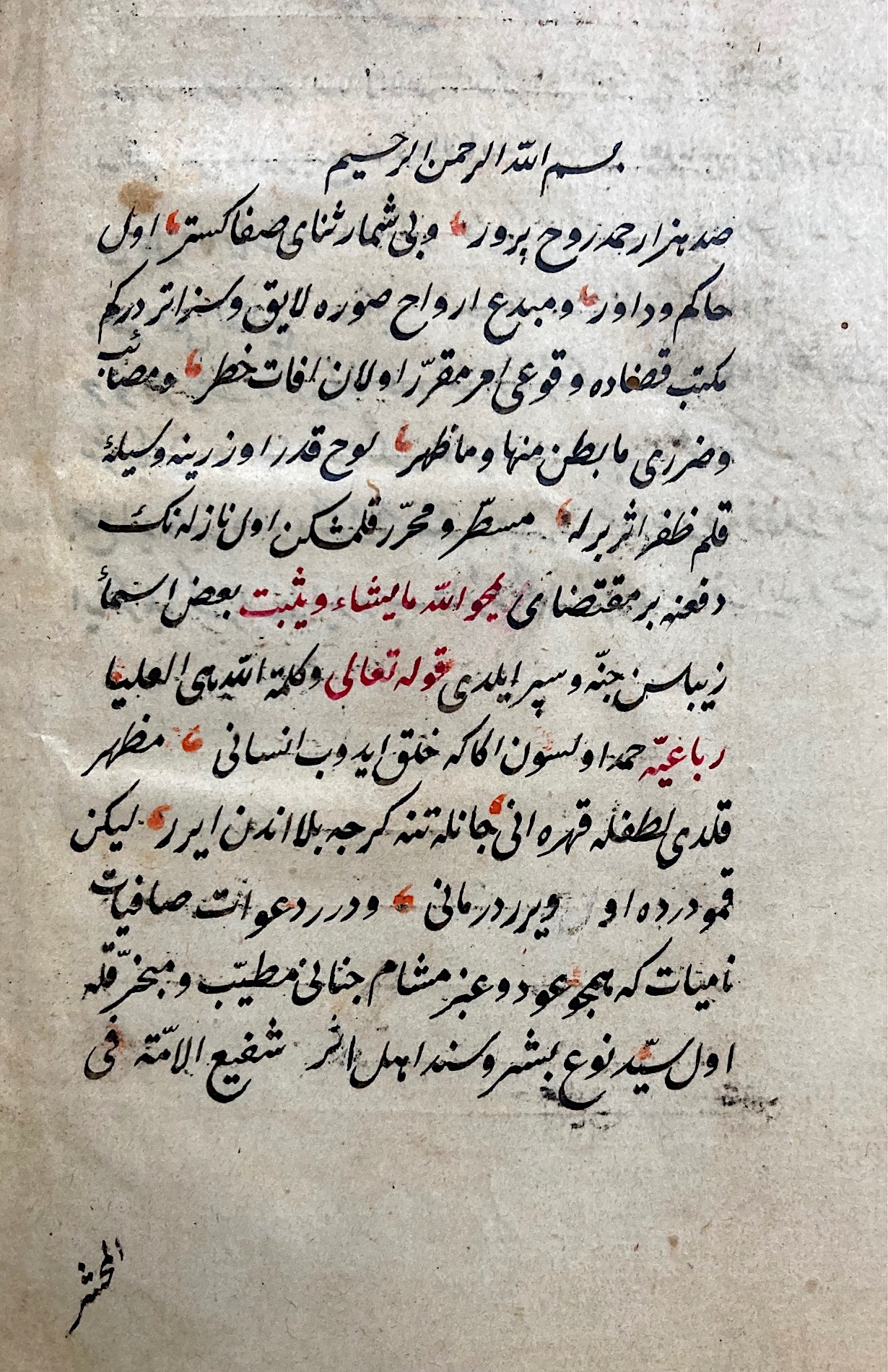
Yemenî Mahmud Efendi
Bahr-i Ali el-müşkülat-i külli kelimati aliyu müşkülat (Hymns of praise for Caliph Ali and his successors, the eleven Imams)
Manuscript in Ottoman Turkish
Copied by Yemenî Mahmud Efendi in Damascus in 1191 H [1777 AD].
94 pp. With 11 full-page havas illustrations , 16 x 12 cm.
Introductory note by the copist: "Al-hakir al-kadir; Mahmud Yemeni had the good fortune to get this copy from a saint when he was in Damascus. This saint had copied it from a manuscript in the treasury of Sultan Shah Mirza in the 841st year of the Hijra. No one who has authority at the highest level in our community is allowed to copy this manuscript." Numerology [number symbolism] is the assignment of meanings to individual numbers or combinations of numbers, whereby the numbers are given a symbolic function tha...
more »
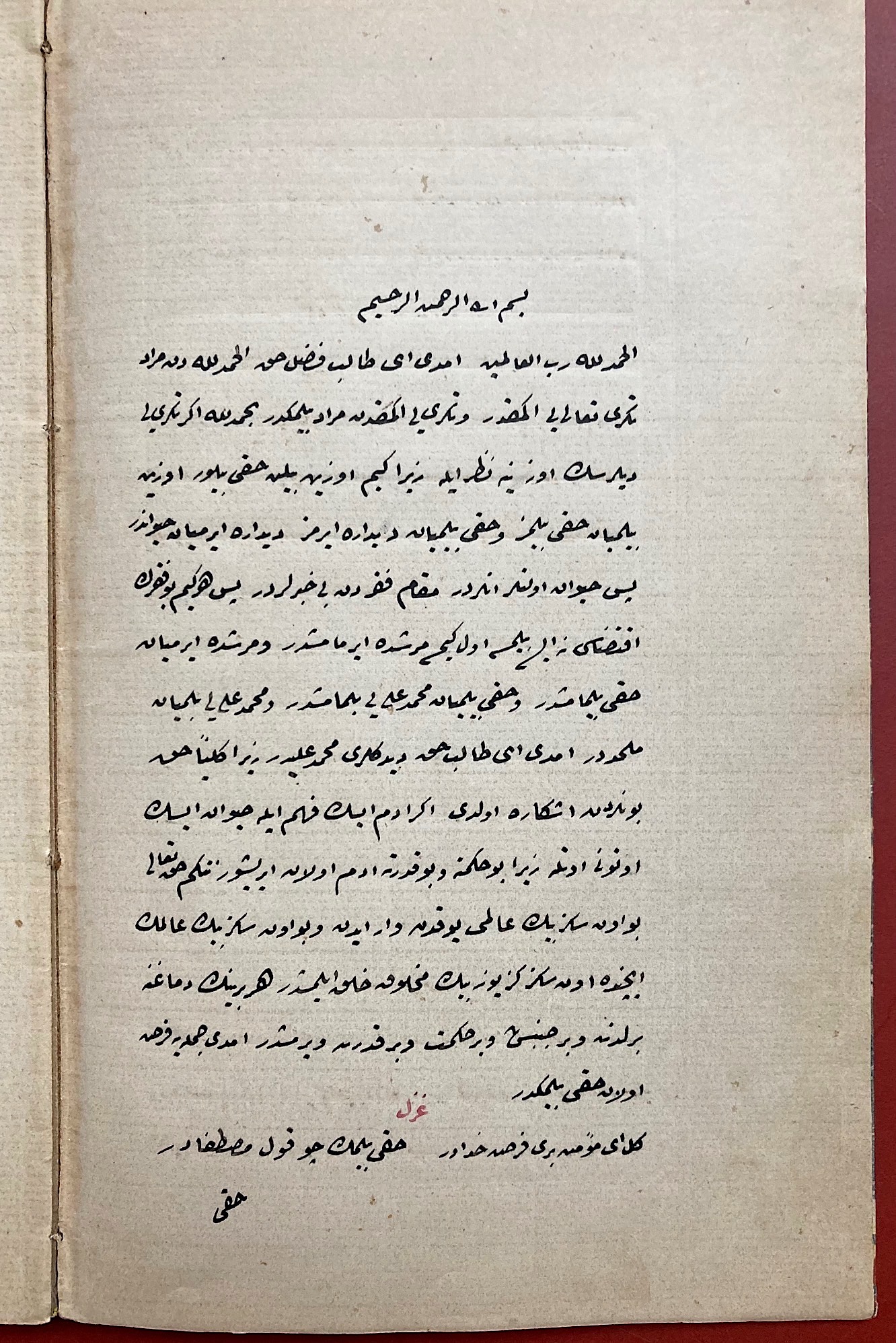
Viranî Baba
Kitab-ı Viranî Baba
Manuscript in Ottoman Turkish, copyist unknown, written 1217 H [1802 AD].
70 pages, 20 x 12 cm.
Marbled cardboard cover with leather spine.
Viranî Baba, an important figure of the Bektashi order, is considered one of the seven great poets of Sufism. He is a mystical poet who deals with the Bektashi teachings in his works. "Kitab-ı Viranî Baba" is one of Virani's most important works. It deals with topics such as religious and moral advice, the Prophet Muhammad, His Holiness Ali, the Twelve Imams and the love of Ahl al-Bayt. Hurufism is a belief system that assigns new meanings to numbers and letters. Many sources indicate that it has influenced Be...
more »
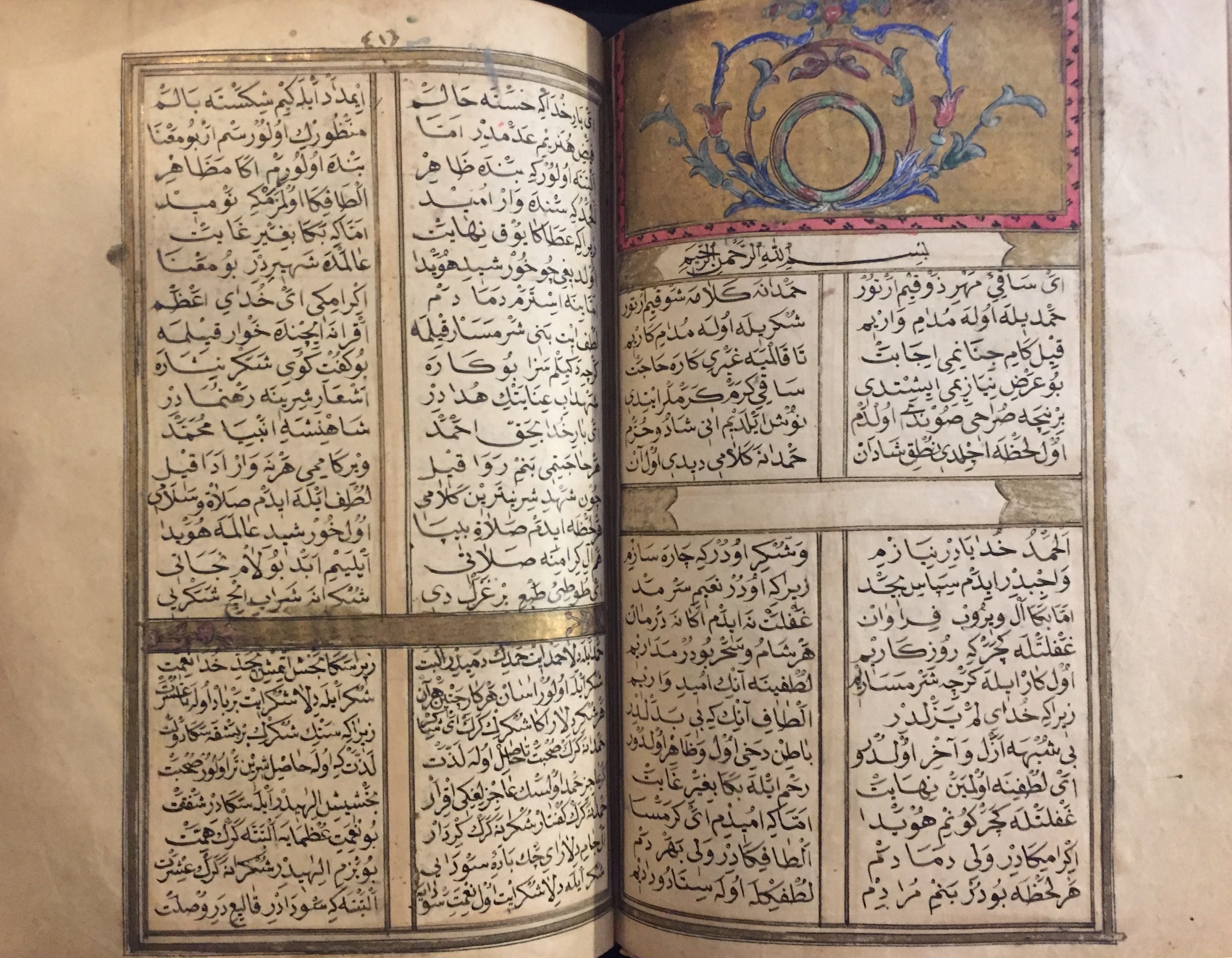
Seyyed Mir Hamza Nigârî, ( 1219 – 1313 H. / 1805 – 1896 AD)
The Complete Works
Manuscripts and Printed Parts in Ottoman Turkish.
Bound in one volume:
1. Dibace/preface, manuscript, 2 pp.
2. Silsila, manuscript, 1 p.
3. Divân-ı Seyyid Nigâri Be-Zeban-ı Türkî and Çaynâme, Istanbul 1302 [1886], Süleyman Efendi Matbaası 366 pp. (with handwritten additions of parts not printed)
4. Nigarnâme, manuscript, author’s copy, 187 pp.
5. Menâkıb-ı Seyyid Nigârî, manuscript, 10 pp.
Mir Hamza Nigari is the most famous mystic in Anatolia and Caucasia in the 19th century. Nigari was born in the town of Zengezur in the Caucasian region of Karaba and received his primary education there. While still young, he moved to Anatolia and joined the smail irvani sect in Amasya. Nigari, who taught mystical principles in Istanbul, Erzurum and Harput, died in Harput and is buried in Amasya. ad 2: Silsila in Sufism is the spiritual chain of a sheikh that connects him to the Prophet Muhammad through previous generations...
more »
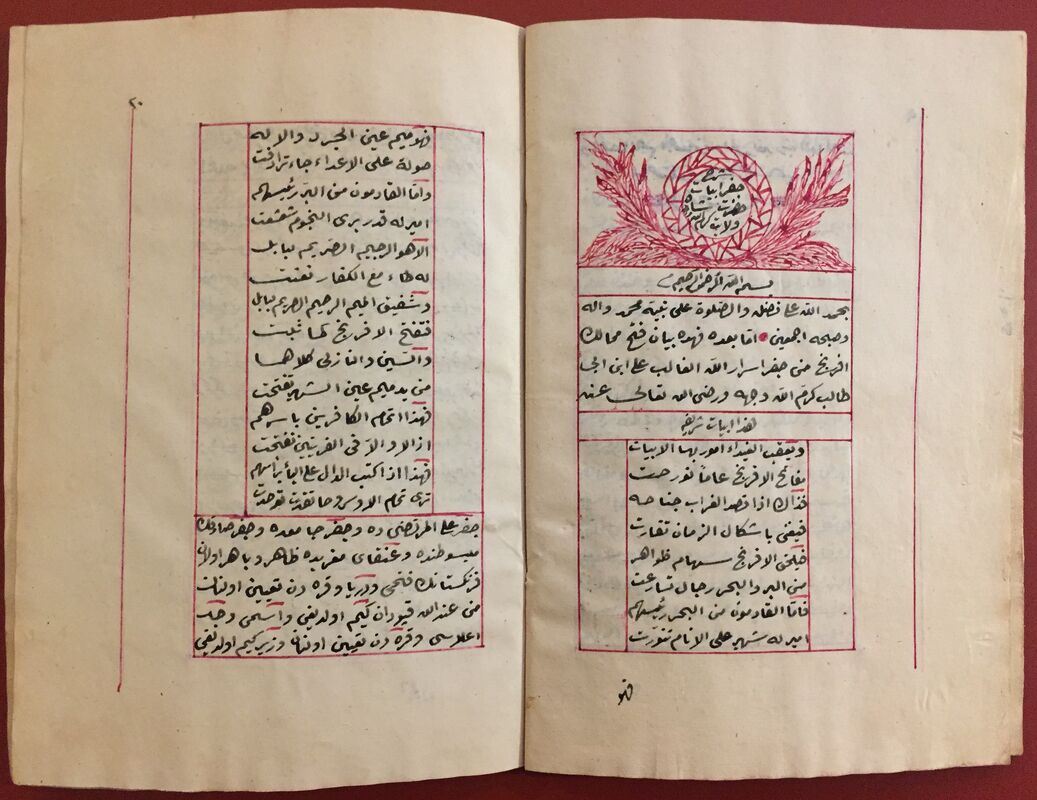
Mustafa Haşim Baba, 1130 - 1197 [1718 - 1718]
Anqāʾ Meşrık (The Griffin of the East)
Manuscript in Ottoman Turkish
Copied by Zeynel Abidin Pur Taksir, 1227 [1812]
28 leaves,
17.5 x 12 cm.
Mustafa Haşim Baba whose pseudonym was "Hâşimî" in his poems, was born in Üsküdar, İstanbul in 1130 [1718]. He was the son of the Yusuf Nizâmeddin Efendi , Sheikh of Bandırmalızade Tekkesi (Dervish lodge). Haşim Baba was educated according to the practices of Jalwatiyya orders, after that he inclinated to Bektashism orders and even he was appointed to the post of Dedebabalık. However, neither the Jalwatis nor the Bektashis had accepted him. He died in 1197 [1718]. After his death, the Hasimiyyas, which was establis...
more »
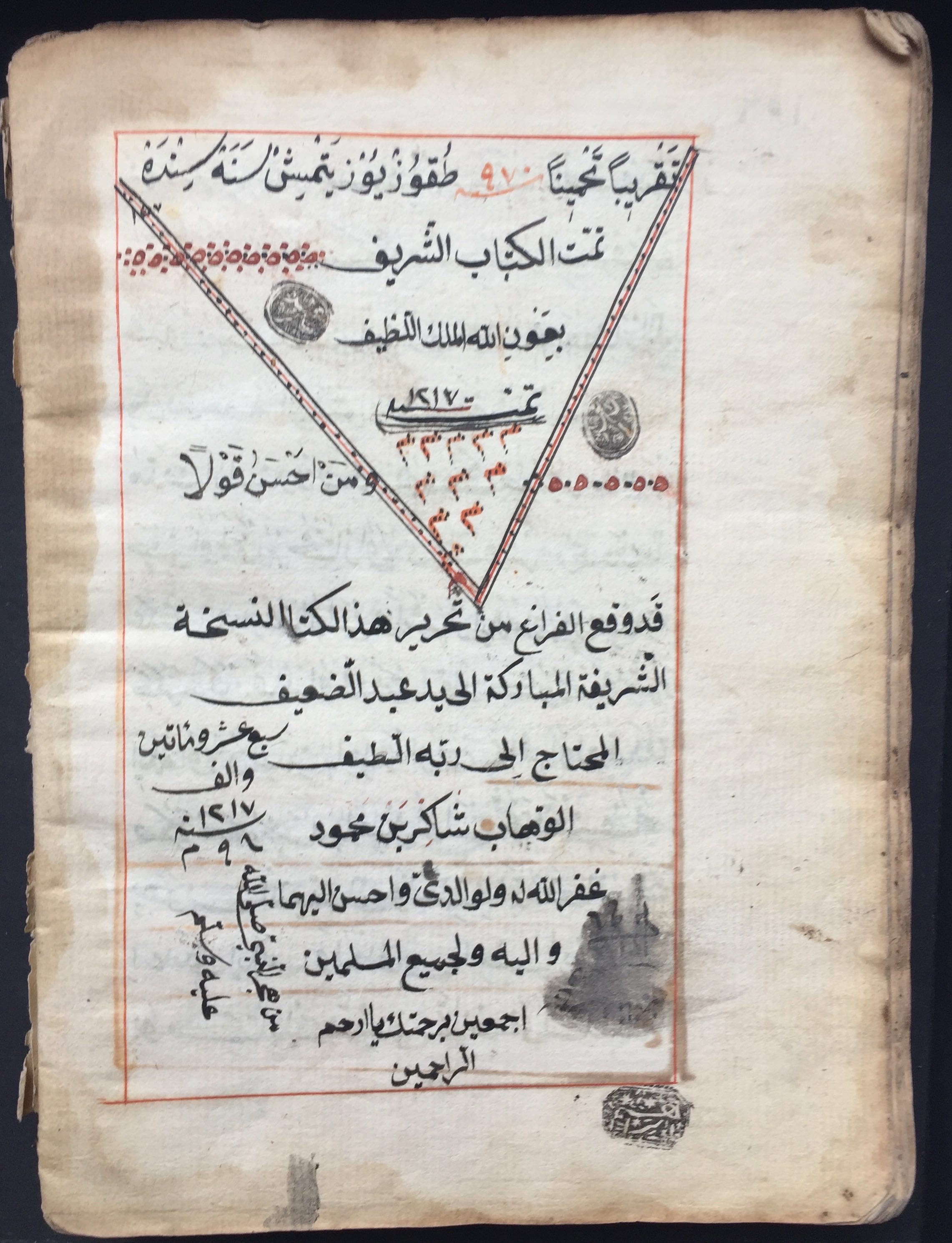
Muhammad Imam Birgivi, Şeyh ‘Aliyyü’s-Sadrî el-Konevî
1) Vasiyetnâme – The Last Will and Testament of Imam Birgivi; and 2) Şeyh ‘Aliyyü’s-Sadrî el-Konevî's commentary on Birgivi's Testament
Two Manuscripts in Ottoman Turkish
(1) Copied by Sakir bin Mahmud, 1217 [1802]
156 leaves, 21 x 15 cm
and
(2) Copied by Ahmed es-Sehid Tahir Hac Mehmed Efendizade, 1133 [1720]
200 leaves, 20 x 13 cm.
ad 1: Muḥammad Imam Birgivi who lived 928 - 980 [27 March 1522 – 15 March 1573] was a Muslim scholar and moralist who lived during the height of the Ottoman Empire and whose texts are used to this day as manuals of spiritual practice throughout the Muslim world. His full name, in Arabic, is Taqī al-Dīn Muḥammad Ibn Pīr ʿAlī al-Birkawī. Born Muḥammad ibn Pīr ʿAlī, in Balikesir, Ottoman Empire, in 1522, Mu ammad was sent to the capital Istanbul to study theology as a young man. He studied law under the chief military judge (ka...
more »
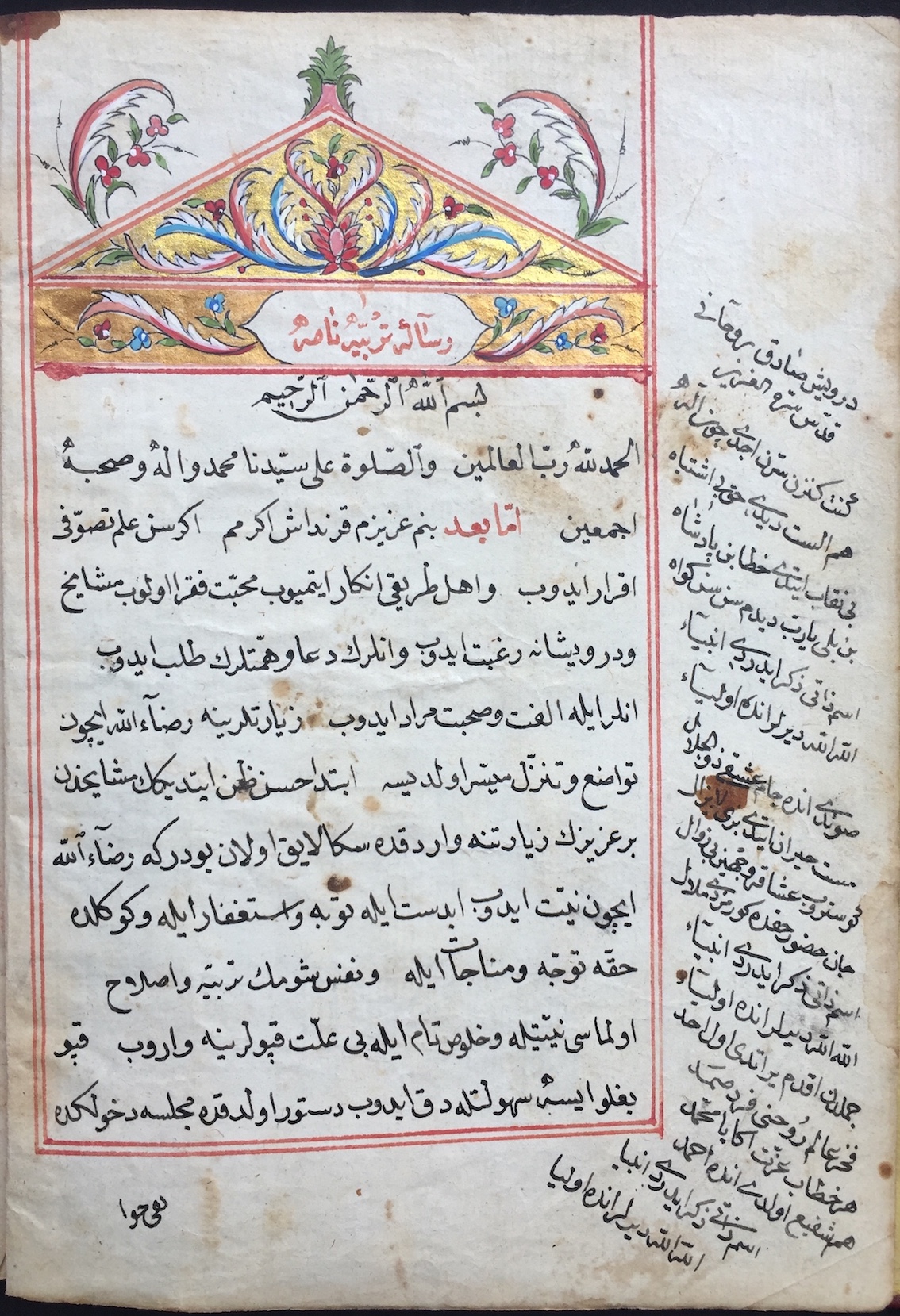
Mehmed Sâdık Erzincânî, 1136 - 1209 [1723 - 1794]
Four Risales and a Letter of Dedication
Manuscript in Ottoman Turkish
4 Risales in 1 Vol. , 27 + 57 + 58 + 19 + 2 = 153 pp.,
19 x 14 cm.
Mehmed Sâdık Erzincânî, also named Muḥammad Ṣādiq al-Arzinǧāni Muftīzāda, Mehmed el-Erzincani, and Muḥammad Ṣādiq Ibn-ʿAbd-ar-Raḥīm al-Muftī. Author of four risales (small texts in the form of a treatise on principles, rules and secrets of the Naqshibendi order. At the end a dedication in the form of a letter to his dervish colleague Mustafa, signed Fukara Muhammad Sadık Erzurumî Derviş Sâdık Erzincânî, 1185 [1771]. 1. Risâle-i Terbiyenâme. Author's copy, dated 1185 [1771], 27 pp. A treatise on Sufi customs, traditions ...
more »
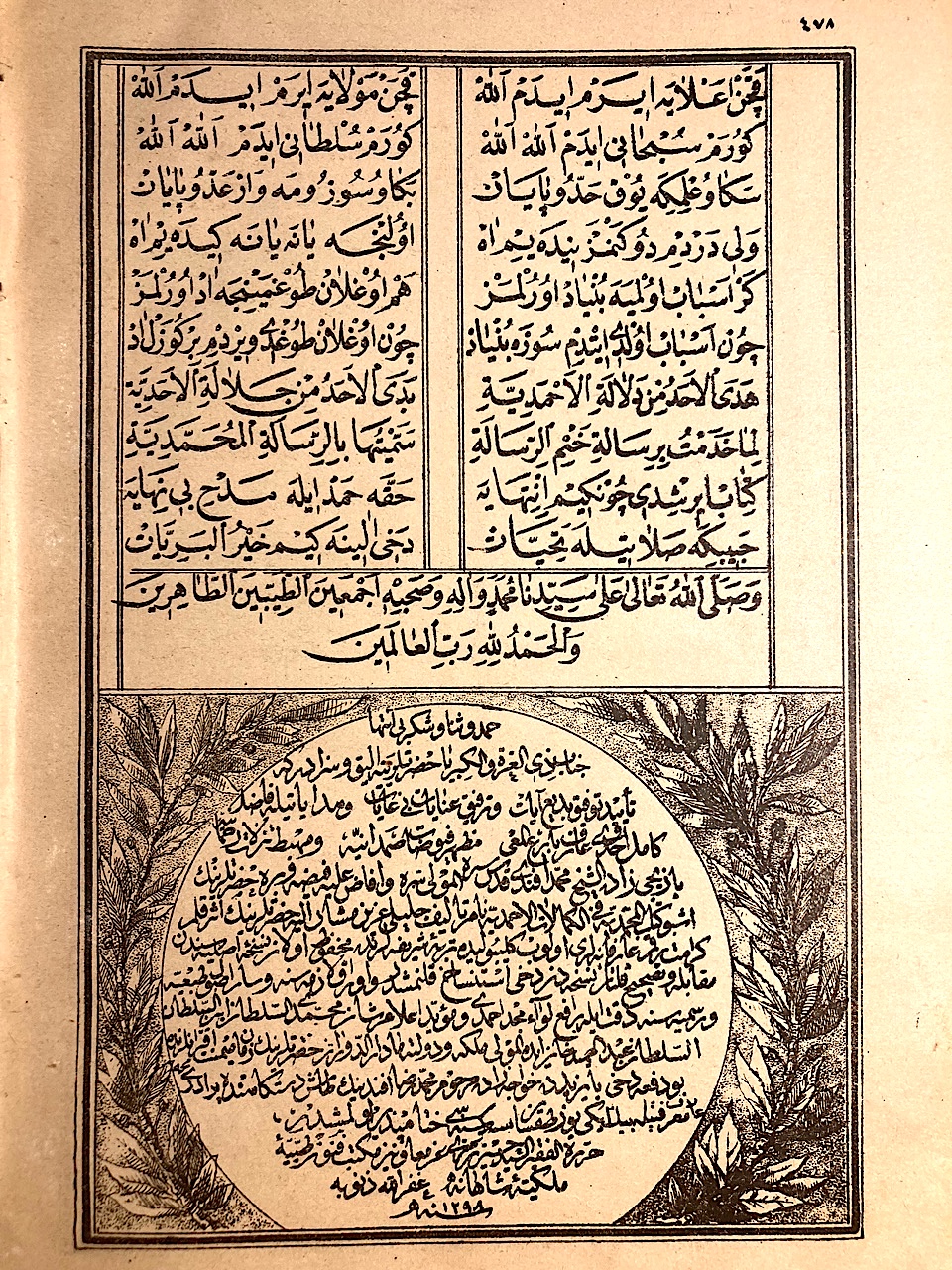
Yazıcızâde Mehmed
Kitâb-ı Muhammediye fî Kemâlâti'l-Ahmediye
Printed in Ottoman Turkish
Istanbul 1298 H / 1881 CE, Hocazâde Merhum Rıza Efendi'nin Matbaası
7, 4, 478 pages, richly illustrated
28 x 20 cm, red linen cover with flap
Özege 10955
A widely popular devotional work on the Prophet Muhammad, first written in Arabic in 1449 by the Ottoman Sufi poet Yazicioglu Mehmet (d. 1491) and translated into Ottoman Turkish by his younger brother Ahmed Bican. Mehmet, a native of the Gallipoli peninsula, was a follower of Haci Bayram-i Veli (1352-1430) and was influenced by the writings of Andalusian mystic Ibn 'Arabi. The earliest printed edition appeared in 1842 at Istanbul's Military Press.
Comprising some 9,000 couplets, the "Muhammadiyah" is on...
more »
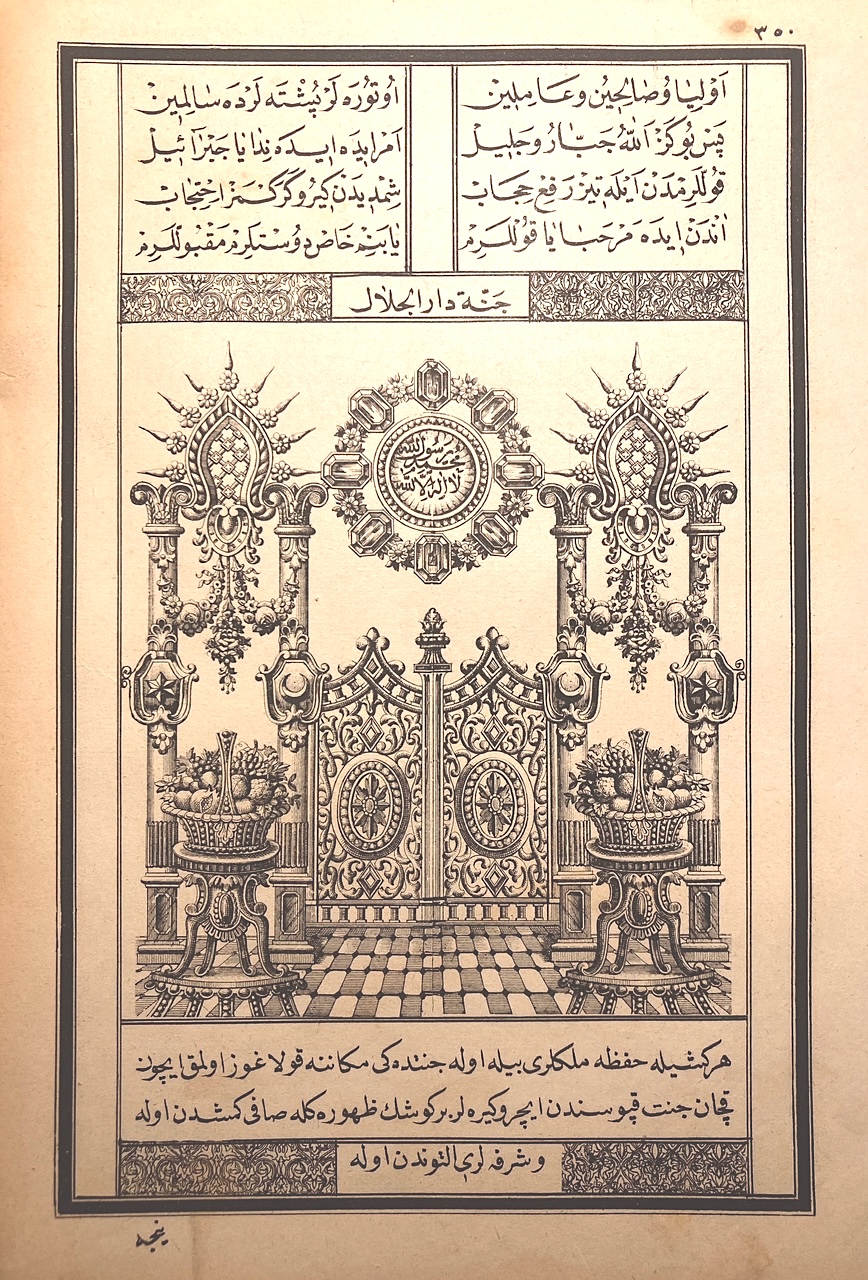
Yazıcızâde Mehmed
Kitâb-ı Muhammediye fî Kemâlâti'l-Ahmediye
Printed in Ottoman Turkish
Istanbul 1306 H. / 1889 CE, Matbaa-i Osmaniye 4, 7, 478 pages, richly illustrated 28 x 20 cm, blue linen cover
Özege 10955
A widely popular devotional work on the Prophet Muhammad, first written in Arabic in 1449 by the Ottoman Sufi poet Yazicioglu Mehmet (d. 1491) and translated into Ottoman Turkish by his younger brother Ahmed Bican. Mehmet, a native of the Gallipoli peninsula, was a follower of Haci Bayram-i Veli (1352-1430) and was influenced by the writings of Andalusian mystic Ibn 'Arabi. The earliest printed edition appeared in 1842 at Istanbul's Military Press.
Comprising some 9,000 couplets, the "Muhammadiyah" is on...
more »
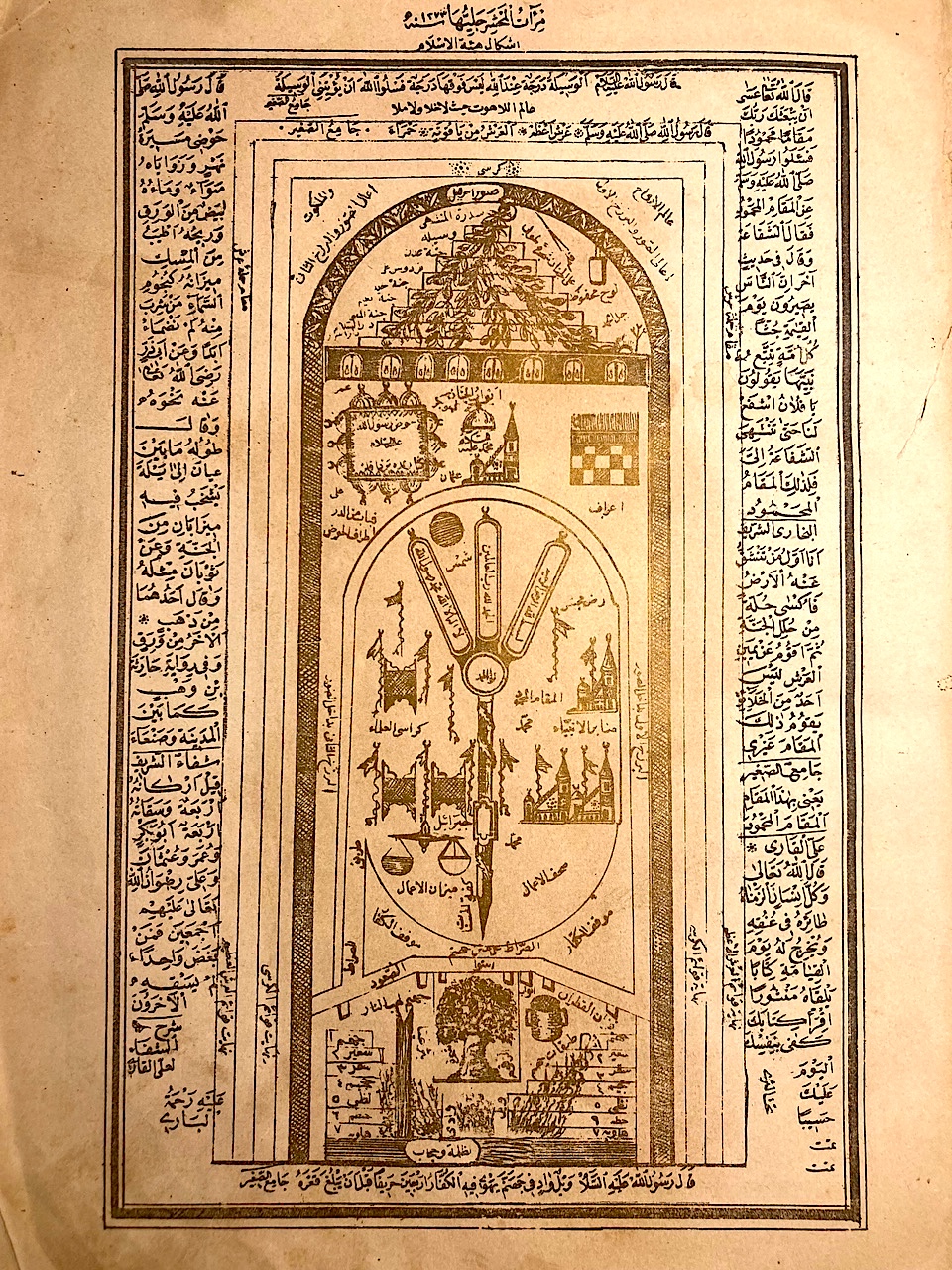
Yazıcızâde Mehmed
Kitâb-ı Muhammediye fî Kemâlâti'l-Ahmediye
Printed in Ottoman Turkish
Istanbul 1273 H / 1856 CE, Tab'hane-i Âmire Taş Destgâhı
6, 4, 447 pages, opening page with lithographic illustration 28 x 20 cm, red leather cover with flap
Özege 10955
A widely popular devotional work on the Prophet Muhammad, first written in Arabic in 1449 by the Ottoman Sufi poet Yazicioglu Mehmet (d. 1491) and translated into Ottoman Turkish by his younger brother Ahmed Bican. Mehmet, a native of the Gallipoli peninsula, was a follower of Haci Bayram-i Veli (1352-1430) and was influenced by the writings of Andalusian mystic Ibn 'Arabi. The earliest printed edition appeared in 1842 at Istanbul's Military Press.
Comprising some 9,000 couplets, the "Muhammadiyah" is on...
more »



